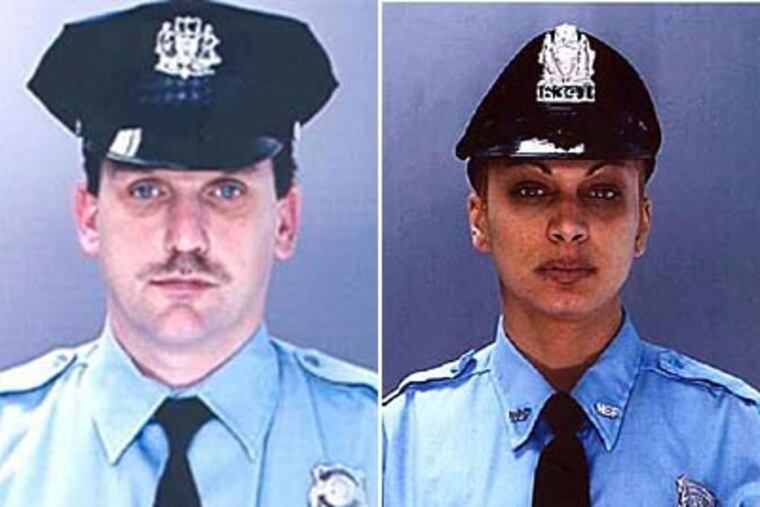Simultaneous trials to begin in two killings of officers
They died on duty, four months apart and in opposite ends of the city, in a year that was arguably the cruelest in Philadelphia police history.

They died on duty, four months apart and in opposite ends of the city, in a year that was arguably the cruelest in Philadelphia police history.
But beginning Monday, the 2008 killings of Sgt. Stephen Liczbinski and Officer Isabel Nazario will be revisited, simultaneously, as their alleged killers go to trial in the Criminal Justice Center.
Two men - Eric DeShann Floyd, 35, of North Philadelphia, and Levon T. Warner, 41, of West Philadelphia - are accused of taking part in the May 3, 2008, bank robbery and chase that ended in Port Richmond with Liczbinski, 39, dead of gunshot wounds.
Howard Cain, 33, the alleged mastermind of the bank robbery scheme, who authorities say shot the 12-year-veteran officer, was killed by police after the three split up and he ran away.
Nevertheless, the District Attorney's Office will seek the death penalty if Floyd and Warner are convicted of first-degree murder.
Assistant District Attorney Jude Conroy has argued that Cain's accomplices knew about or handled the high-powered Chinese SKS rifle used to shoot Liczbinski and so are equally culpable in his death.
Three floors above the Floyd-Warner trial, jury selection also will begin for Andre Butler, 18, of Mantua, charged in the Sept. 5, 2008, death of Nazario after a high-speed chase in West Philadelphia.
Nazario, 40, an officer for 18 years, was killed instantly when the patrol car in which she was riding was broadsided by the fleeing, stolen Cadillac Escalade driven by Butler.
Nazario's partner, Terry Tull, 39, a 14-year officer, was seriously injured but lived. Tull has since returned to active duty and will testify at the trial.
Unlike Floyd and Warner, Butler will not face possible execution if convicted. Butler is charged with third-degree murder, which carries a 20- to 40-year prison term.
For Philadelphia's law enforcement community, especially police families, the trials will likely be the most emotionally difficult weeks since last year's nine-day trial of the killer of veteran Officer Chuck Cassidy.
John Lewis, 23, was convicted and sentenced to death in the Halloween 2007 shooting of Cassidy, 54, during an armed robbery at a West Oak Lane doughnut shop.
Even in a larger courtroom - the same to be used in the Liczbinski case - Lewis' trial almost daily drew capacity crowds of uniformed officers.
That scene seems sure to be repeated this week. Officials of Fraternal Order of Police Lodge 5, which represents more than 14,000 active and retired city police and sheriff's deputies, have encouraged officers to stop by trials involving slain officers to show support and pay respects to the families.
For many officers, Cassidy's murder was the first shot in what seemed like a siege of the 6,600-member force.
Cassidy's killing was followed by five others: four in 2008, including Sgt. Patrick McDonald, 30, and Sgt. Timothy Simpson, 46; and Officer John Pawlowski, 25, in February 2009.
Since Cassidy's killing, FOP president John J. McNesby regularly attends court proceedings. So, too, does Judy Cassidy, the officer's widow, who has become the de facto public face of police survivors and their families.
Of the two trials, Butler's is expected to be shorter and less complex, if only because the death penalty is not at issue.
Assistant District Attorney John Doyle said he expected jury selection to take a day, with opening statements and testimony starting Tuesday before Common Pleas Court Judge Jeffrey P. Minehart, who also presided over the Cassidy trial.
Butler's attorney, Neil E. Jokelson, said he did not want to comment before trial.
At Butler's 2008 preliminary hearing, his then-lawyer argued for trial on a lesser count of homicide by vehicle. He cited Butler's immaturity - then 16 - and that he plowed into Nazario's patrol car because it happened to be in the intersection he ran trying to elude police.
As for Floyd and Warner's trial, there are issues aplenty, even excepting the death penalty and a dead gunman.
Both men made statements to police after arrest. Floyd's attorney, William L. Bowe, has renewed a move to have separate trials, saying Warner's statements and defense are prejudicial to Floyd.
Floyd is alleged to have been the getaway-car driver, who told Warner to give Cain the rifle when they could not shake the pursuing Liczbinski.
Warner's attorney, meanwhile, has argued in pretrial hearings that Warner suffers from brain damage that makes him especially susceptible to others' influence.
Warner was a heavyweight boxer active from 1993 to 2007 with a record of six wins, five losses, and two draws. Defense attorney Gary S. Server has posited that Warner's three knockouts left him with a brain injury.
What gets to a jury was still being thrashed out Friday, and that debate will continue Monday before Common Pleas Court Judge Renee Cardwell Hughes.
Once pretrial issues are resolved, said prosecutor Conroy, jury selection should take a week, followed by about three weeks of trial before the jury begins deliberations.